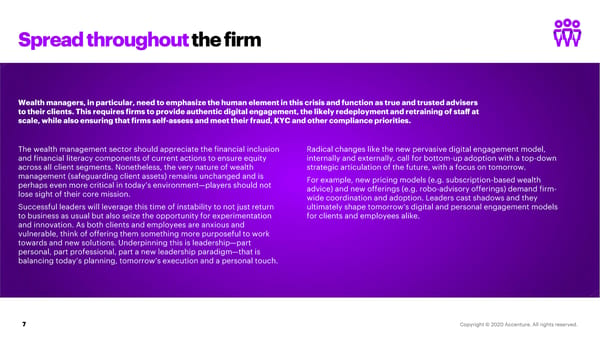Spread throughoutthe firm Wealth managers, in particular, need to emphasize the human element in this crisis and function as true and trusted advisers to their clients. This requires firms to provide authentic digital engagement, the likely redeployment and retraining of staff at scale, while also ensuring that firms self-assess and meet their fraud, KYC and other compliance priorities. The wealth management sector should appreciate the financial inclusion Radical changes like the new pervasive digital engagement model, and financial literacy components of current actions to ensure equity internally and externally, call for bottom-up adoption with a top-down across all client segments. Nonetheless, the very nature of wealth strategic articulation of the future, with a focus on tomorrow. management (safeguarding client assets) remains unchanged and is For example, new pricing models (e.g. subscription-based wealth perhaps even more critical in today’s environment—players should not advice) and new offerings (e.g. robo-advisory offerings) demand firm- lose sight of their core mission. wide coordination and adoption. Leaders cast shadows and they Successful leaders will leverage this time of instability to not just return ultimately shape tomorrow’s digital and personal engagement models to business as usual but also seize the opportunity for experimentation for clients and employees alike. and innovation. As both clients and employees are anxious and vulnerable, think of offering them something more purposeful to work towards and new solutions. Underpinning this is leadership—part personal, part professional, part a new leadership paradigm—that is balancing today’s planning, tomorrow’s execution and a personal touch. 7
 A Capital Markets Industry Perspective: COVID 19 Page 6 Page 8
A Capital Markets Industry Perspective: COVID 19 Page 6 Page 8